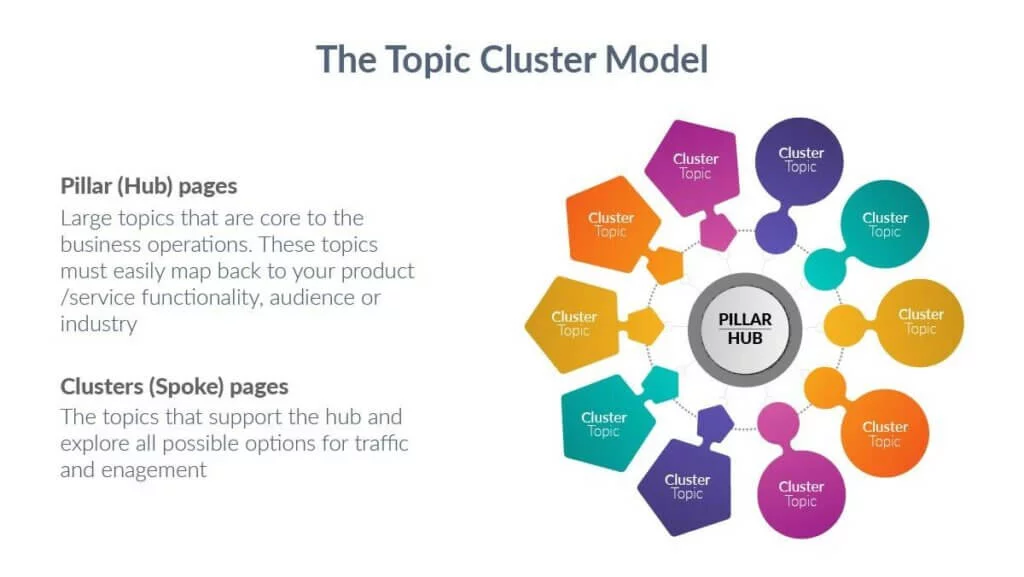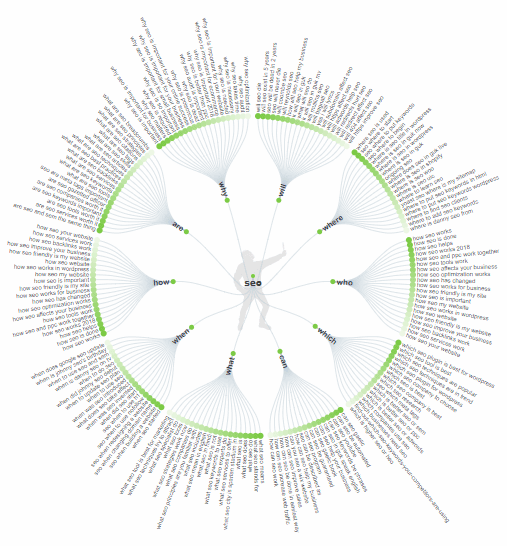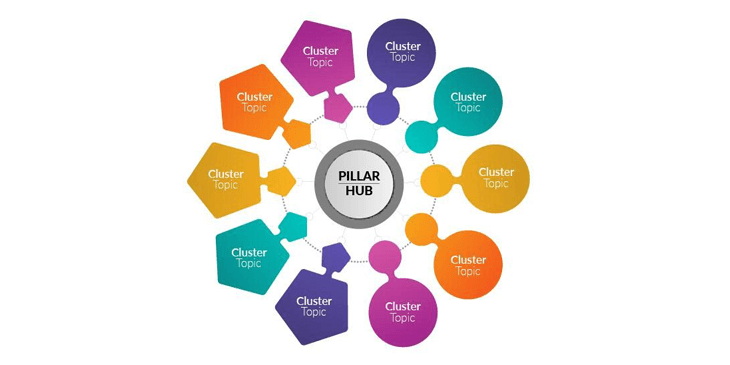Content, backlinks, technical SEO – these are common terms that are consistently referenced as the “pillars” of a rock-solid SEO strategy.
But one arguably equally important aspect of a solid strategy is topical authority.
“Topical Authority” refers to your website’s perceived authority in a specific topic or subtopic within your industry.
Naturally, Google wants to direct users to websites that are experts in the topics that they cover. But evaluating whether or not a piece of content is a good fit for ranking for a specific keyword is not the only thing they need to do to uncover content from “experts.”
A website might have a good article on a specific subject, but if they don’t offer a range of content that supports adjacently related topics — are they really the best source to be delivering this information to Google users?
Topical authority is how Google measures expertise, authoritativeness, and trustworthiness (E.A.T. ), in a given topic. Some have gone as far as to call topical authority “the new keyword research.” It’s that important.
What Is Topical Authority, Exactly?
Topical Authority is exactly what the name suggests — a website’s authority on a given topic based on a variety of different factors — primarily based on the content that they have published.
A website that has published two articles on a topic will not have the same topical authority as a website that has published several dozen, a whitepaper, and a series of videos. Nor should they.
A big piece of the topic authority puzzle is publishing content that covers related topics as well.
For instance, if you are writing about “content marketing” – related topics might include things like grammar tips, editing, SEO, etc.
Writing about those main and related topics boosts your overall topical authority in Google’s eyes. This is often referred to as the hub and spoke method.
They have modeled a system that is based on real life. If John has published 5 articles on architectural engineering in popular trade mags, and Rick has published 35 — who is more likely to be perceived as the “expert” of the two? Rightfully, Rick.
Topical authority gives Google a simple way to ask, “Is this brand devoted to publishing high-quality information about this topic?”
Their primary goal is always pushing users toward the best possible results for their query.
This is also why the “hub and spoke,” or “topic cluster” strategy has become popular in SEO. Originally conceived by HubSpot, this strategy focuses on covering all relevant topics within a specific topic and sub-topic, with a main directory-style page that links out to them. Then, those pages interlink together.
Essentially, this shows Google that you have not only covered many different topics and angles of a particular subject, but it also makes it simple for Google to find all of those pieces of content through direct interlinking between them.

This was primarily a way to create structured topical authority on subjects that were critical to a business. Delivering the idea of topical authority in this way makes it more actionable, while encouraging best practices for on-page SEO.
How Google’s Hummingbird Update Set the Stage for Topical Authority
Let’s take a quick trip back in time to Google’s original Hummingbird Update of 2013.
At the time, Google had a problem. They were beginning to better understand user intent and more accurately be able to assess when websites were providing the information that users wanted. But, they needed to better understand the context and relationships between words.
The Hummingbird algorithm update focused on exactly that, putting topical authority at the forefront of SEO and drastically altering the search landscape.
Prior to Hummingbird, Google primarily ranked sites based on a combination of inbound links, content keyword share, and technical SEO.
Their content analysis was relatively primitive. If you had a page that had a lot of links pointing toward it with the right anchor text, you had a good chance of ranking for your targeted keyword. But that meant that the search results could be easily gamed, artificially pushing pages to the top.
With the update, Hummingbird gave them the tools that they needed to better analyze content and rank it based on relevance to the query from the user.
Further, Hummingbird allowed Google to provide context from the broader search landscape. Out of the Top 10 results — who is talking about what sub-topics? Which website delivered the most comprehensive piece of content? And who had other related content that visitors were likely to click-through to?
Hummingbird also improved Google’s backlink analysis. If a website with high topical authority in your space links to you, that should count for more than some random website, even if they do have some authority.
With the update, Google could better assess high-quality links. Hummingbird provided the context that Google needed to weigh the importance of the other factors they were already tracking.
It also worked to push the quality of the content online upwards. Since Google was spending more energy analyzing pages for context, companies that went above and beyond to create truly comprehensive longform content that thoroughly answered customer questions were able to reap the benefits.
Pushing up the quality of content on the internet also worked in Google’s favor, by providing better experiences to their users.
When it first launched, Hummingbird was estimated to have impacted 90% of all searches on Google. Even today, the remnants of the Hummingbird update have been iterated on, and still play a huge role in how Google analyzes pages and ranks their search listings today.
Latent Semantic Indexing and Topical Authority
Latent semantic indexing (LSI) keywords are one of Google’s most important tools for gauging the topical authority of a website. Proper LSI keyword placement can have a big impact on outcomes.
See, to identify that a website has published many pieces of content on a specific subject, Google needs to be able to evaluate the text on the page and draw conclusions about it. This is done with LSI, and was a big part of the Hummingbird update.
LSI keywords are topically related keywords to the main subject of a piece of content. If you published an article about skateboarding, for instance, LSI keywords might include things like famous skaters, skate park information, styles of skating, and equipment.
Every subject on earth has many branches of sub-topics that branch off from the main topic.

This is, in part, how Google evaluates topical authority. They check to make sure that a website is not only covering the main idea but is also covering important related sub-topics as well. And not just on the main article, but across the website as a whole.
Why Is Topical Authority a Good Indicator for Google?
To explain topical authority clearly, let’s consider a hypothetical example.
Let’s say that you are a student researching World War 2 for a research project in school. Specifically, you want to learn about a specific battle.
So naturally, you Google it. Since it is a famous battle, many websites have information about it. Wikipedia is there. A page from a World War 2 museum.
Then there is the third result. You click it. The article is fine, it perfectly explains the battle and what happened during it. It references outside sources and is more interesting and easier to follow than Wikipedia and other dryer sources.
But there’s a problem. As you take a look at the other articles on the site, you notice that you don’t see any other pieces that specifically cover World War 2. There are articles about auto insurance, foreign affairs, sports. It all seems pretty random.
Do you trust this website? Should you trust this website? The article was solid. It seemed authoritative. But how can it be, really? The website has no focus. It seems to be a random collection of articles.
What makes them qualified to provide information about World War 2? How did the outcome of the battle butterfly effect out to affect future battles? Are there articles about those battles to provide additional context? No.
Many people wouldn’t trust the article, and Google knows that. And they wouldn’t be wrong not to trust it, either.
Ultimately, Google wants to connect its users with the best possible search results for the queries and questions that they enter into their Google Search bar.
A big part of that is ensuring that they are sending their users to authoritative, trusted sources. They don’t just want to send users to “the best” article on a given topic, they want to send them a publisher that also covers related topics to provide additional context. Someone that truly knows the topic at hand.
That goes for all searches that their users make — whether they are looking to buy a product, find out information, or find a piece of media. Google always wants to make sure that they are sending their users to the best possible source.
A website that focuses exclusively on World War 2 and has a track record of publishing content about that subject will almost always be a better fit than a website that publishes about dozens of different unrelated topics.
There is an inherent level of knowledge there that just can’t be replicated by specialization.
How to Build Topical Authority
Building topical authority is relatively straightforward on the surface. You build out high-quality content on subjects that are directly and adjacently related to your business.
In practice, it is a little more complicated than that.
Like SEO as a whole, topical relevance itself is a mashup of several different indicators that Google considers to determine if your website is an authority on a specific subject.
First and foremost, content matters most of all. If you publish a lot of great content on a specific topic, your topical authority on that subject is bound to increase. But only if the content is truly high-quality and ideally, brings something unique to the table when compared to the competition.
Ultimately, the quality of your content is not just measured on the page, but in the actions that users take. The more time they spend on your website, the more of your content they read, or the more aspects of your page that they engage with — the higher the perceived value is for the user.
As with SEO in general, the more content formats that you can deliver the information in, the better. If your company is not just publishing articles, but also podcasts, videos, eBooks, and social media updates about a topic, Google will detect that widespread specialization.
But topical authority doesn’t end at content. Other questions may play a role in this as well.
For instance, do other authorities on that same topic link to you or reference your work? Does your company post about those topics on social media? How often are you updating the website with information about the topic? As new information becomes available, like say a scientific study, and permeates itself throughout search — are you incorporating that new information into your content?
These are all relevant questions.
Topical authority is not just about publishing content, but more broadly working to deliver well-researched, authoritative information about a subject. Your content needs to not just be great, but also be up to date.
That means that to be a true authority on a topic, there is an ongoing investment that is required. Topical authority doesn’t come from working on a few pieces of content over weeks or months, but rather becoming a trusted source for information about a topic in perpetuity.
Do Backlinks Play a Role In Topical Authority?
The short answer is “yes.” Backlinks do play a role in how Google views your topical authority.
When your content resources are linked to by large publications or by other smaller websites that are also considered a topical authority in your niche — this is a huge indicator of your content’s reliability and authority.
And it should be. As with SEO in general, a backlink from a trusted digital publication conveys that you are providing content of value. It’s a vote of confidence.
The more authority websites that are giving you a vote of confidence in the form of a link, the less risk there is in sending their users to your website in Google’s eyes. When a page on your website has links from the New York Times, Los Angeles Times, Tech Crunch, and a smattering of smaller industry-related websites — that is a good sign that the information that you are delivering is trustworthy.
Try to find ways to create linkable content within your content strategy.
Topical Authority for Smaller Sites vs. Larger Sites
The important thing to know about topical authority is that it works in the favor of smaller websites. When it comes to SEO — the ‘big players’ flood the SERPs and can make it hard for smaller sites to compete.
But topical authority can level the playing field.
See, the larger the publication, the less likely they are to deep-dive into the weeds of a topic. This means covering all of the small use cases and minor sub-topics that a subject brings to the table.
This allows for smaller websites to carve out their own space in the search results by honing in on specific topics. In raising their topical authority, they’ll be able to compete with large more authoritative sites for search share.
Let’s consider our previous example, the search about the specific battle in World War 2.
Lot’s of large websites might publish an article about that battle. But how many are going to dig deeper? How many will break down the strategic decisions made on both sides? Who will really evaluate the context of those decisions and provide additional context for the decisions that were made? Who will consider how the outcome impacted both sides and may have affected future decisions? Does one source include research from WW2 scholars?
In all likelihood, the smaller, more specialized website is more likely to dive into the gritty details. And that is exactly how they should look to differentiate themselves and compete with larger sites in the SERPs — by digging deeper into subjects where larger brands won’t spend their time.
Topical Authority Is Simply a Better Way to Measure Overall Authority
‘Topical authority’ is the term that Google and SEOs have adopted in the wake of the 2013 Hummingbird update to describe Google’s more advanced way of evaluating content and determining a website’s authority on a certain subject.
In publishing thorough content about the main topic and many related sub-topics, you can reliably increase your topical authority in a given subject and, in theory, increase your rankings for related keywords.
As with SEO in general, other factors such as on-page technical factors and backlinks still play a huge role in the traffic that you generate — even if your brand is considered an authority in a certain subject. But topical authority has essentially become the “new keyword research,” allowing brands to position themselves as true authorities in the subjects that they care about most.


